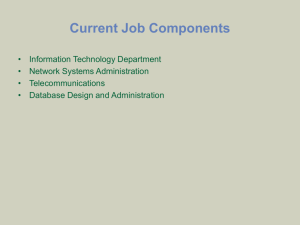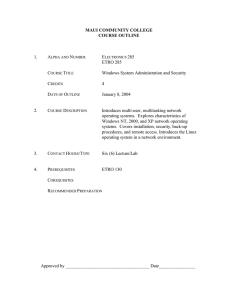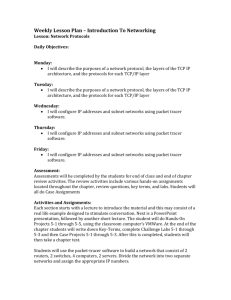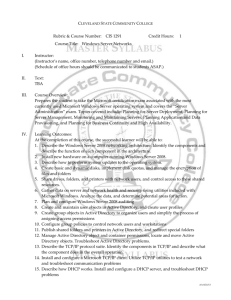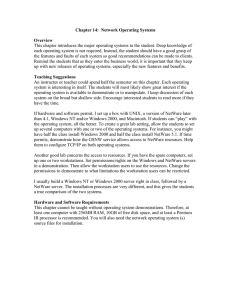CIT266 Syllabus 1Sem 2012.doc
advertisement
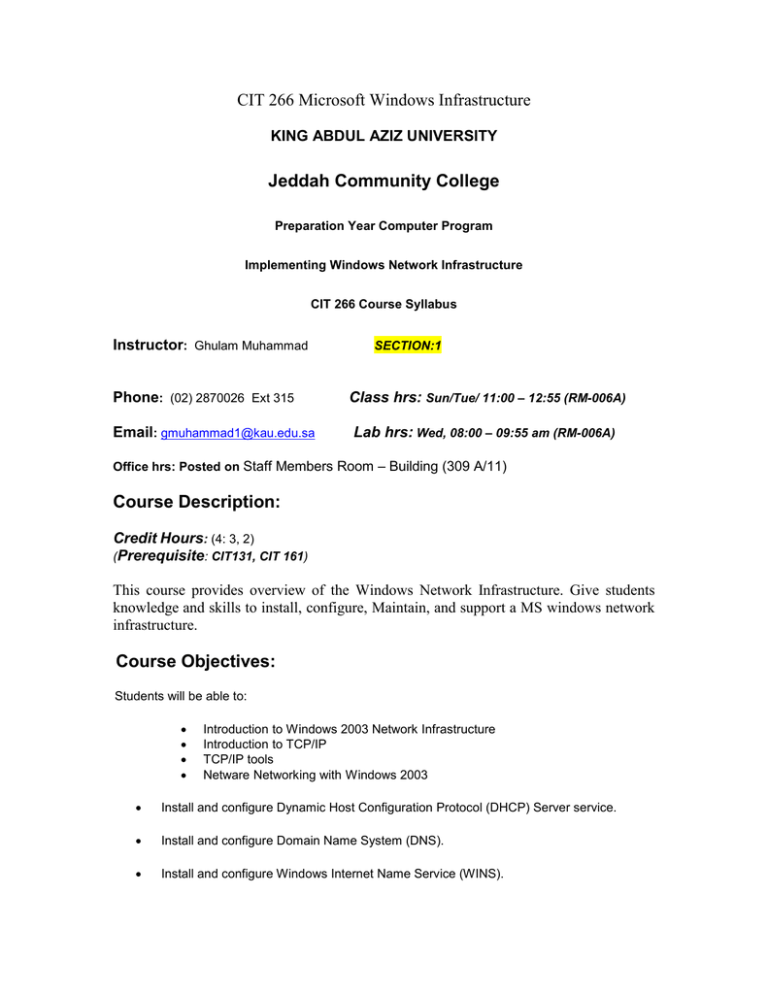
CIT 266 Microsoft Windows Infrastructure KING ABDUL AZIZ UNIVERSITY Jeddah Community College Preparation Year Computer Program Implementing Windows Network Infrastructure CIT 266 Course Syllabus Instructor: Ghulam Muhammad Phone: (02) 2870026 Ext 315 Email: gmuhammad1@kau.edu.sa SECTION:1 Class hrs: Sun/Tue/ 11:00 – 12:55 (RM-006A) Lab hrs: Wed, 08:00 – 09:55 am (RM-006A) Office hrs: Posted on Staff Members Room – Building (309 A/11) Course Description: Credit Hours: (4: 3, 2) (Prerequisite: CIT131, CIT 161) This course provides overview of the Windows Network Infrastructure. Give students knowledge and skills to install, configure, Maintain, and support a MS windows network infrastructure. Course Objectives: Students will be able to: Introduction to Windows 2003 Network Infrastructure Introduction to TCP/IP TCP/IP tools Netware Networking with Windows 2003 Install and configure Dynamic Host Configuration Protocol (DHCP) Server service. Install and configure Domain Name System (DNS). Install and configure Windows Internet Name Service (WINS). Install and configure transmission Control Protocol/Internet Protocol(TCP/IP) Define a custom subnet mask and define a range of valid addresses Create and manage certificates. Configure remote access to a server. Configure Windows server as a network router. Deploy Windows workstations using Remote Installation Services (RIS). Establish connectivity for NetWare, UNIX, and Macintosh systems. Implement a web server. Install and configure Simple Network management Protocol (SNMP) Textbooks / Required Materials: ALS Microsoft® Windows® 2003 Network Infrastructure Administration, Microsoft Corporation, Second Edition, Microsoft Press. Required Materials: Storage media (Flash Memory, Handy Drive etc.) Two blank CD. Location for text book and materials The text book and the required materials can be purchased from Mareekh bookstore 02-6527052 Jeddah Attendance: 1. Students are required to attend all class/Lab meetings. 2. The students are expected to be in class on time. 3. Those who come in the class after the lecturer considered LATE 4. Two late appearances in the class are considered as one absent and will be recorded in the instructors Grade Book 5. After ten (15) minutes the students are marked absent 6. After Eleven (11) absents, a grade of “DN” (Denied) will be issued It's responsibility of the student to keep the record of his absences. SPECIAL Accommodations: If there is any student in this class who has special needs because of learning disabilities or other disabilities, please discuss these needs with your instructor or please contact Course Coordinator. Requirements: Class/Lab attendance and participation Quizzes Homeworks/assignments Evaluation / Grading: Students must earn 60% at least of the total possible points. The official grades in this course are: Marks Grade 95-100% 90-94% 85-89% 80-84% 75-79% 70-74% 65-69% 60-64% 0-59% A+ A B+ B C+ C D+ D F Students earn 59% and below are failed, F (Failed Grade). Denied students will earn DN (denied grade). Students who do not attend at all (any exam, any lecture and any Lab) will be considered AF (Absent Fail grade). Evaluation Policy:Item Marks Homework / Assignments Quizzes Researches / Reports Exam I (Written) Exam II (Written) Final Exam (comprehensive) 5% 5% 10% 20% 20% 40% Late Assignments: All assignments are due at the BEGINNING of class on the due date. Late assignments will be penalized as follows: one day late...1 grade reduction, two days late...two grades reduced, after three days...1/2 credit. If a student submits more than two late assignments in a term, additional late papers may not be accepted. Course Procedures: Students may collaborate on assignments, but each student must submit an original copy of his/her OWN work. If an assignment is obviously copied, individuals involved may receive no credit. If a student must miss a class/Lab he is expected to contact the instructor regarding make-up work before the next class meets. Keep all graded papers to verify grades. It is the student's responsibility to officially drop a class. Failure to officially withdraw from a course may result in a F (Failed grade) or AF (Absent Failed grade). Cell phones, pagers and electronic entertainment devices must be turned off during all class and Lab times. Students violating this policy may be asked to leave class. Course Schedule Week No. Contents i. Introduction to Windows 2003 Network Infrastructure a. Introduction to MS Windows Networking 1 b. OSI Reference Model (ch-1) ii. Introduction to TCP/IP a. Configuring TCP/IP b. Define a custom subnet mask and define a range of valid addresses 2 c. Using Windows 2003 TCP/IP Tools (ch-2) iii. 3 iv. TCP/IP tools a. Ping b. Pathping c. IPconfig d. ARP e. Netstat f. TelNet b. g. FTP (ch-3) Netware Networking with Windows 2003 a. Introduction to IPX and NWlink b. Netware Core Protocol 4 c. Windows 2003 Netware Compatibility d. Connectivity with Other Operating Systems e. Connectivity issues f. NetWare g. UNIX EID Break v. Implementing the Dynamic Host Configuration Protocol a. Overview 5 b. DHCP installation and configuration c. DHCP in a routed environment vi. d. DHCP troubleshooting Install and configure Domain Name System (DNS) a. IP host naming and DNS 6 b. Resolving Host names with DNS c. Planning a DNS implementation Exam 1 vii. Install and configure Windows Internet Name Service (WINS) Part II a. Introduction to NetBIOS 7 b. WINS Name Registration and resolution c. Implementing WINS viii. Create and manage certificates. a. Introducing certificates 8 b. Installing and configuring MS certificates c. Managing certificates ix. Configure remote access to a server. a. Inbound and outbound connections 9 b. Routing and remote access x. c. Troubleshooting Traffic Security a. Public Key infrastructure b. Certificates 10 c. Active Directory for certificates d. Internet Protocol Security (IPSec) e. Server security EXAM II xi. 20% Network Router a. Internet Protocol (IP) routing b. Transmission Control Protocol/Internet Protocol (TCP/IP) filtering 11 c. Monitoring d. Troubleshooting Hajj Break xii. Remote Installation a. Remote Installation Services (RIS) overview 12 b. RIS installation and configuration c. Windows installation on client workstation using RIS xiii. Web Server a. Internet access b. 13 Internet Information configuration Server (IIS) installation and c. Web site configuration d. Troubleshooting 14 Review of the entire course for the final exam FINAL EXAM, comprehensive (40%) NOTES: 1. The suggested Home Work (H.W.) is considered as minimum sets of problems. It's the responsibility of the student to solve as many as he can from the list of problems at the end of each required section. 2. Students must do their best to complete LAB exercises during the LAB time; it's the instructor responsibility to discuss the discussion questions at the end of each LAB. Good Luck **************************
